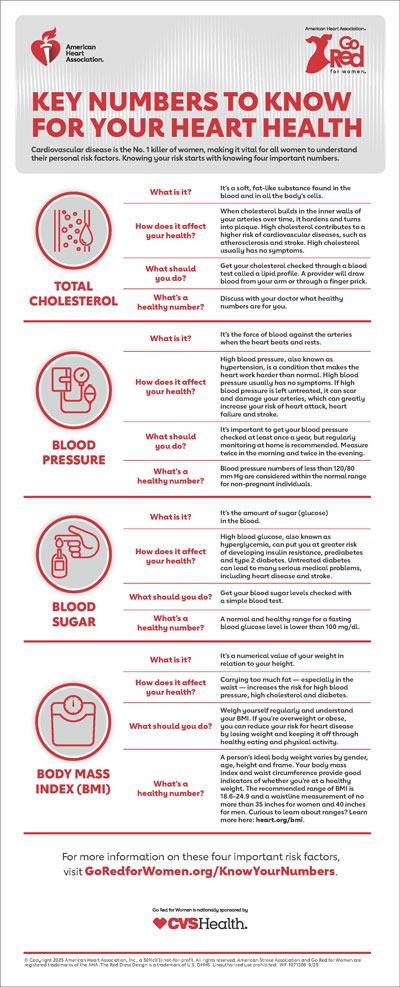Key Numbers to Know for Your Heart Health Infographic
Cardiovascular disease is the No. 1 killer of women, making it vital for all women to understand their personal risk factors. Knowing your risk starts with knowing four important numbers.
Total Cholesterol
What is it?
It’s a soft, fat-like substance found in the blood and in all the body’s cells.
How does it affect your health?
When cholesterol builds in the inner walls of your arteries over time, it hardens and turns into plaque. High cholesterol contributes to a higher risk of cardiovascular diseases, such as atherosclerosis and stroke. High cholesterol usually has no symptoms.
What should you do?
Get your cholesterol checked through a blood test called a lipid profile. A provider will draw blood from your arm or through a finger prick.
What’s a healthy number?
Discuss with your doctor what healthy numbers are for you.
Blood Pressure
What is it?
It’s the force of blood against the arteries when the heart beats and rests.
How does it affect your health?
High blood pressure, also known as hypertension, is a condition that makes the heart work harder than normal. High blood pressure usually has no symptoms. If high blood pressure is left untreated, it can scar and damage your arteries, which can greatly increase your risk of heart attack, heart failure and stroke.
What should you do?
It’s important to get your blood pressure checked at least once a year, but regularly monitoring at home is recommended. Measure twice in the morning and twice in the evening.
What’s a healthy number?
Blood pressure numbers of less than 120/80 mm Hg are considered within the normal range for non-pregnant individuals.
Blood Sugar
What is it?
It’s the amount of sugar (glucose) in the blood.
How does it affect your health?
High blood glucose, also known as hyperglycemia, can put you at greater risk of developing insulin resistance, prediabetes and type 2 diabetes. Untreated diabetes can lead to many serious medical problems, including heart disease and stroke.
What should you do?
Get your blood sugar levels checked with a simple blood test.
What’s a healthy number?
A normal and healthy range for a fasting blood glucose level is lower than 100 mg/dl.
Body Mass Index (BMI)
What is it?
It’s a numerical value of your weight in relation to your height.
How does it affect your health?
Carrying too much fat — especially in the waist — increases the risk for high blood pressure, high cholesterol and diabetes.
What should you do?
Weigh yourself regularly and understand your BMI. If you’re overweight or obese, you can reduce your risk for heart disease by losing weight and keeping it off through healthy eating and physical activity.
What’s a healthy number?
A person’s ideal body weight varies by gender, age, height and frame. Your body mass index and waist circumference provide good indicators of whether you’re at a healthy weight. The recommended range of BMI is 18.6-24.9 and a waistline measurement of no more than 35 inches for women and 40 inches for men. Curious to learn about ranges? Learn more here: heart.org/bmi.
For more information on these four important risk factors, visit goredforwomen.org/knowyournumbers
Go Red for Women is nationally sponsored by CVS Health.
© Copyright 2025 American Heart Association, Inc., a 501(c)(3) not-for-profit. All rights reserved. American Stroke Association and Go Red for Women are registered trademarks of the AHA. The Red Dress Design is a trademark of U.S. DHHS. Unauthorized use prohibited. WF-1071306 9/25

View or Download Infographic
Key Numbers to Know for Your Heart Health Infographic (PDF)